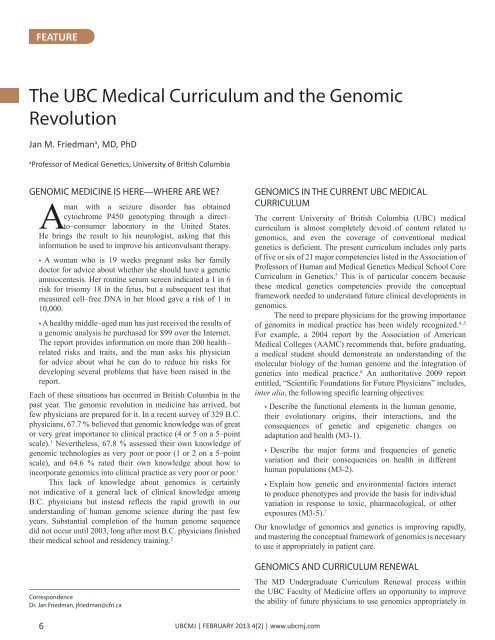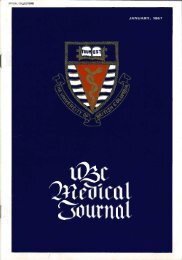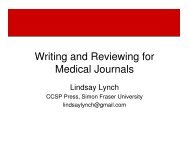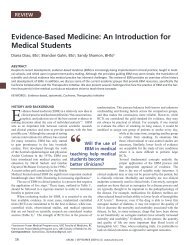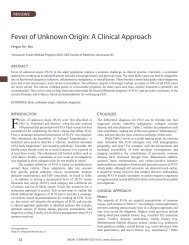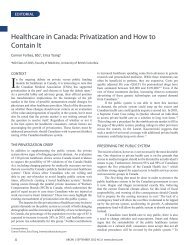Download full PDF - UBC Medical Journal
Download full PDF - UBC Medical Journal
Download full PDF - UBC Medical Journal
Create successful ePaper yourself
Turn your PDF publications into a flip-book with our unique Google optimized e-Paper software.
FEATURE<br />
The <strong>UBC</strong> <strong>Medical</strong> Curriculum and the Genomic<br />
Revolution<br />
Jan M. Friedman a , MD, PhD<br />
a<br />
Professor of <strong>Medical</strong> Genetics, University of British Columbia<br />
GENOMIC MEDICINE IS HERE—WHERE ARE WE<br />
A<br />
man with a seizure disorder has obtained<br />
cytochrome P450 genotyping through a direct–<br />
to–consumer laboratory in the United States.<br />
He brings the result to his neurologist, asking that this<br />
information be used to improve his anticonvulsant therapy.<br />
• A woman who is 19 weeks pregnant asks her family<br />
doctor for advice about whether she should have a genetic<br />
amniocentesis. Her routine serum screen indicated a 1 in 6<br />
risk for trisomy 18 in the fetus, but a subsequent test that<br />
measured cell–free DNA in her blood gave a risk of 1 in<br />
10,000.<br />
• A healthy middle–aged man has just received the results of<br />
a genomic analysis he purchased for $99 over the Internet.<br />
The report provides information on more than 200 health–<br />
related risks and traits, and the man asks his physician<br />
for advice about what he can do to reduce his risks for<br />
developing several problems that have been raised in the<br />
report.<br />
Each of these situations has occurred in British Columbia in the<br />
past year. The genomic revolution in medicine has arrived, but<br />
few physicians are prepared for it. In a recent survey of 329 B.C.<br />
physicians, 67.7 % believed that genomic knowledge was of great<br />
or very great importance to clinical practice (4 or 5 on a 5–point<br />
scale). 1 Nevertheless, 67.8 % assessed their own knowledge of<br />
genomic technologies as very poor or poor (1 or 2 on a 5–point<br />
scale), and 64.6 % rated their own knowledge about how to<br />
incorporate genomics into clinical practice as very poor or poor. 1<br />
This lack of knowledge about genomics is certainly<br />
not indicative of a general lack of clinical knowledge among<br />
B.C. physicians but instead reflects the rapid growth in our<br />
understanding of human genome science during the past few<br />
years. Substantial completion of the human genome sequence<br />
did not occur until 2003, long after most B.C. physicians finished<br />
their medical school and residency training. 2<br />
Correspondence<br />
Dr. Jan Friedman, jfriedman@cfri.ca<br />
GENOMICS IN THE CURRENT <strong>UBC</strong> MEDICAL<br />
CURRICULUM<br />
The current University of British Columbia (<strong>UBC</strong>) medical<br />
curriculum is almost completely devoid of content related to<br />
genomics, and even the coverage of conventional medical<br />
genetics is deficient. The present curriculum includes only parts<br />
of five or six of 21 major competencies listed in the Association of<br />
Professors of Human and <strong>Medical</strong> Genetics <strong>Medical</strong> School Core<br />
Curriculum in Genetics. 3 This is of particular concern because<br />
these medical genetics competencies provide the conceptual<br />
framework needed to understand future clinical developments in<br />
genomics.<br />
The need to prepare physicians for the growing importance<br />
of genomics in medical practice has been widely recognized. 4.,5<br />
For example, a 2004 report by the Association of American<br />
<strong>Medical</strong> Colleges (AAMC) recommends that, before graduating,<br />
a medical student should demonstrate an understanding of the<br />
molecular biology of the human genome and the integration of<br />
genetics into medical practice. 6 An authoritative 2009 report<br />
entitled, “Scientific Foundations for Future Physicians” includes,<br />
inter alia, the following specific learning objectives:<br />
• Describe the functional elements in the human genome,<br />
their evolutionary origins, their interactions, and the<br />
consequences of genetic and epigenetic changes on<br />
adaptation and health (M3-1).<br />
• Describe the major forms and frequencies of genetic<br />
variation and their consequences on health in different<br />
human populations (M3-2).<br />
• Explain how genetic and environmental factors interact<br />
to produce phenotypes and provide the basis for individual<br />
variation in response to toxic, pharmacological, or other<br />
exposures (M3-5). 7<br />
Our knowledge of genomics and genetics is improving rapidly,<br />
and mastering the conceptual framework of genomics is necessary<br />
to use it appropriately in patient care.<br />
GENOMICS AND CURRICULUM RENEWAL<br />
The MD Undergraduate Curriculum Renewal process within<br />
the <strong>UBC</strong> Faculty of Medicine offers an opportunity to improve<br />
the ability of future physicians to use genomics appropriately in<br />
6<br />
<strong>UBC</strong>MJ | FEBRUARY 2013 4(2) | www.ubcmj.com


